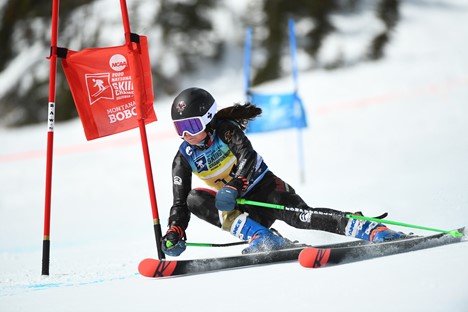In my last article, I explored the psychological challenges of having a fast first run and then trying to duplicate it in your second run to have a fast race. In this article, I focus on the inverse, namely, having a poor first run and wanting to salvage the race (even if it’s just a little dignity) with a better second run.
There are two types of bad first runs. First, ones that are caused by the same list of mental obstacles I described in my last article that can lead to a disappointing second run after a fast first run:
- A preoccupation with results.
- Comparison with others.
- Outcome expectations.
- Negative attitude.
- Fear of failure.
- Threat reaction.
- Pre-race anxiety (because of all the above).
All of these, when experienced before your first run, will likely result in tentative or mistake-ridden skiing and end your day even before you get to your second run. You feel angry, frustrated, and beyond disappointed. You don’t even want to take your second run!
 The second type of poor first run occurs because, as I’ll discuss in a future article, s&%# happens in ski racing. What I mean by this is that you may be completely physically and mentally prepared to crush your first run, but the almighty ski-racing gods decide that they are going to throw a rut, a piece of ice, a tough combination, a poorly set binding, a change in terrain, or a gust of wind at you. The result is that you get back, inside, off balance, shot off the course, and either make a huge “I’m starting way back second run” mistake or DNF. And if you do finish, meaning your day isn’t officially over, though it feels that way, you are so far out you have no chance of a decent result or scoring opportunity. Just like the first type of poor first run, you are dejected and want to go and hide.
The second type of poor first run occurs because, as I’ll discuss in a future article, s&%# happens in ski racing. What I mean by this is that you may be completely physically and mentally prepared to crush your first run, but the almighty ski-racing gods decide that they are going to throw a rut, a piece of ice, a tough combination, a poorly set binding, a change in terrain, or a gust of wind at you. The result is that you get back, inside, off balance, shot off the course, and either make a huge “I’m starting way back second run” mistake or DNF. And if you do finish, meaning your day isn’t officially over, though it feels that way, you are so far out you have no chance of a decent result or scoring opportunity. Just like the first type of poor first run, you are dejected and want to go and hide.
I will say that there is a very big difference between these two types of ski-racing “fails.” The first type of poor first run will likely produce a big helping of “Why did I ski like such a wimp?!?!” In contrast, if you were charging and made a big mistake or DNF’d, though disappointed, you should also feel good that you gave it your all, because that’s all you can do on race day. As the old saying goes, “sometimes you bite the dog and sometimes the dog bites you.” If you keep charging, at some point, you will bite the dog (so why not try to bite the dog on your second run).
Regardless of which type of poor first run you had, you have a choice to make before your second run: “Do I “call it in” on my second run (meaning you just go through the motions and get the day over with as soon as possible) or do I decide WTF, I might as well just let ‘er rip because I’ll feel a whole lot worse if I go out with a whimper rather than a bang?
Though the answer may be self-evident, your embarrassment at such a poor first run and your loss of motivation, confidence, and focus may pull you to the “dark side” before your second run, making it nearly impossible for you to get your act together and prepare for a better second run.
pull you to the “dark side” before your second run, making it nearly impossible for you to get your act together and prepare for a better second run.
To give yourself the chance at a fast second run after a poor first run, let me start with a approach to your race day that you might deploy to shift your mindset of disappointment and resignation to anger and determination. It involves seeking a “lose”-“win”-win rather than a lose-lose-lose despite the less-than-stellar first run. The triple-lose is that you will have two poor runs, rather than just one, you will not achieve your race-day goals, and you will feel immense regret for not going full gas on either or both runs.
The “lose”-“win”-win is that you will, unfortunately, have a disappointing first run (that’s the life of a ski racer!), but I put “lose” in quotes because, if you were charging, then that is a partial win for the reasons I mentioned above. The first “win” in quotes means that you charge on your second run (which is a victory in itself) and, if things go your way, you may be really fast. The last unquoted win is that, at the end of your race day, you can look back with some pride that you kept fighting despite a substandard first run (thus winning the mental race) and you don’t feel regret because you didn’t give up on yourself.
Here are few practical tools you can use to rebound from your first run and finish the day on a high note:
- Allow yourself to be disappointed with your first run, but, instead of giving up, get mad and turn those negative emotions into a fight response.
- Ask yourself: “Do I want to have a bad second run too?” (hopefully, the answer is no!).
- Redirect your focus from the poor first-run result and onto the what you need to do to have a better second run (go from outcome to process focus).
- Do a bunch of mental imagery of how you want to ski your second run (aggressively and fast!).
- Hydrate and fuel yourself well between runs (your mind can’t work if your body doesn’t work).
- Take some free-ski runs with a focus on confidence and aggressiveness.
- Stick with your race routine.
- In the start area, make a commitment to charge and to fight from start to finish.
The bottom line is that, regardless of how you do your first run, your singular goal is to “bring it” on your second run.




